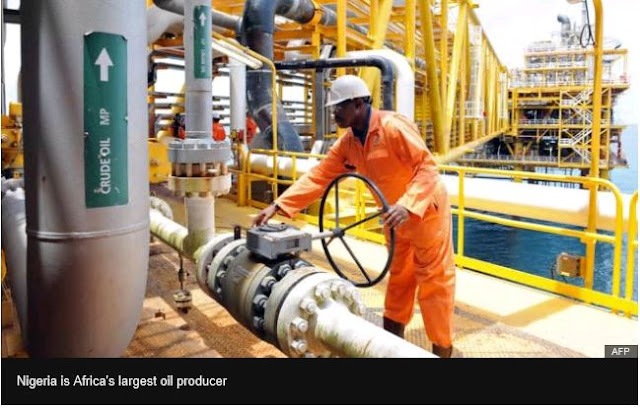Nigeria's state-owned oil company has failed to pay the government $16bn (£11bn) in a suspected fraud, according to an official audit.
The Nigerian National Petroleum Corporation (NNPC) provided no explanation for the missing funds, the auditor general told MPs.
Oil revenue accounts for two-thirds of the government's funding.
President Muhammadu Buhari has promised to crack down on corruption since coming to office last May.
The NNPC has not commented on the auditor general's findings.
Analysis - Martin Patience, BBC News, Lagos
This finding by the auditor general, while shocking, is not a surprise.
Officials from the previous administration allegedly indulged in wholesale corruption where billions of dollars of oil funds simply disappeared.
When the then central bank governor Lamido Sanusi pointed out that billions of dollars were missing from the treasury, he was sacked from his job.
Nigeria's oil reserves should have been blessing for Nigeria to be used to build infrastructure and invest in social services.
Instead, it has been a curse, a lubricant that has produced massive corruption and dysfunctional governments.
President Buhari was elected on a platform of cleaning up the country's notoriously corrupt politics.
But some officials from the previous administration accuse him of using corruption to pursue a political vendetta.
◾Can Nigeria defeat oil corruption?
◾Nigeria battles economic slowdown
The state oil giant has been mired in corruption allegations and losing money for many years.
Last month, the government announced that the NNPC would be broken up into seven different companies.
A separate audit ordered under former President Goodluck Jonathan and carried out by global accountancy firm PwC, found that the NNPC had failed to pay the government $1.48bn between January 2012 and July 2013.
It did not provide a total figure for how much revenue the NNPC should legally have handed over to the treasury.
However, the company said that it could not vouch for the integrity of the information it was given when it conducted the audit.
Nigeria is Africa's biggest oil producer, but the economy has suffered because of the recent decline in the price of oil.
Source
The Nigerian National Petroleum Corporation (NNPC) provided no explanation for the missing funds, the auditor general told MPs.
Oil revenue accounts for two-thirds of the government's funding.
President Muhammadu Buhari has promised to crack down on corruption since coming to office last May.
- More on this and other African news stories
- Buhari's battle to clean up Nigeria's oil industry
The NNPC has not commented on the auditor general's findings.
Analysis - Martin Patience, BBC News, Lagos
This finding by the auditor general, while shocking, is not a surprise.
Officials from the previous administration allegedly indulged in wholesale corruption where billions of dollars of oil funds simply disappeared.
When the then central bank governor Lamido Sanusi pointed out that billions of dollars were missing from the treasury, he was sacked from his job.
Nigeria's oil reserves should have been blessing for Nigeria to be used to build infrastructure and invest in social services.
Instead, it has been a curse, a lubricant that has produced massive corruption and dysfunctional governments.
President Buhari was elected on a platform of cleaning up the country's notoriously corrupt politics.
But some officials from the previous administration accuse him of using corruption to pursue a political vendetta.
◾Can Nigeria defeat oil corruption?
◾Nigeria battles economic slowdown
The state oil giant has been mired in corruption allegations and losing money for many years.
Last month, the government announced that the NNPC would be broken up into seven different companies.
A separate audit ordered under former President Goodluck Jonathan and carried out by global accountancy firm PwC, found that the NNPC had failed to pay the government $1.48bn between January 2012 and July 2013.
It did not provide a total figure for how much revenue the NNPC should legally have handed over to the treasury.
However, the company said that it could not vouch for the integrity of the information it was given when it conducted the audit.
Nigeria is Africa's biggest oil producer, but the economy has suffered because of the recent decline in the price of oil.
Source














No comments
Post a Comment
Note: only a member of this blog may post a comment.